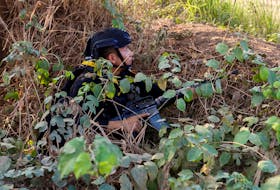TRURO, N.S. – Police officers in Truro are being trained to spot potential human trafficking situations after the province recently announced revised domestic violence guidelines.
Common signs of human trafficking include victims appearing malnourished or destitute, lacking proper identity documents, showing signs of abuse or injury, having a reluctance to speak with police and giving seemingly scripted or rehearsed responses to questioning.
“If you go to a domestic-type situation it could seem run-of-the-mill, but there could be a sexual assault component or someone being held against their will,” said Chief David MacNeil of Truro Police Service. “It’s looking beyond the obvious. “Police in Truro and elsewhere will also learn about risk assessment, investigation and arrest protocols, supporting children on the scene and the use of emergency protection orders, among other topics.
The revised training program, announced Thursday, is being given to officers from the RCMP, municipal departments and military police. Over the next two months, six train-the-trainer sessions are being led by representatives from the Nova Scotia Department of Justice, RCMP, Public Prosecution Service and the Medical Examiner's office.
“They’re not easy investigations to conduct, there is some danger involved,” said MacNeil of domestic violence calls.
In any domestic violence situation, a victim has often experienced abusive incidents 10 or more times in a row before calling police.
For MacNeil, that means showing patience and compassion toward victims who contact the police. Officers build a relationship with them, providing referrals to counselling or mental health services, as well as local organizations such as The Lotus Centre – A Resource for Women.
While some people have managed to break free and are no longer victims, it is not always easy for police to help those who have suffered domestic violence. For example, abusers may control their partner’s finances, own the family home or have custody of children. The children themselves can suffer secondary trauma from witnessing violent incidents at home.
Nonetheless, MacNeil warned would-be abusers that they will face consequences for their behavior.
“In Nova Scotia, there is no place for domestic violence. It’s unfortunate that in 2018 we still have to talk about this,” said MacNeil.
The province says that while men and women report similar rates of violence, the severity, frequency, and consequences are greater for women. For example, a woman is five times more likely to need medical attention or hospitalization.








